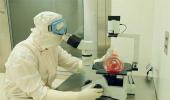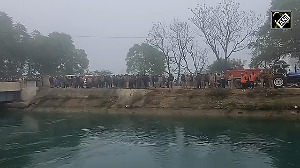The Australian immunologist, who cautioned that the number of COVID-19 cases will rise in the coming days, said the earliest time frame for an effective vaccine 'going into large numbers of people' is nine to 12 months.

Warning of the tightrope walk ahead as governments battle the COVID-19 crisis, Nobel laureate Peter Charles Doherty has expressed concern about densely populated countries such as India relaxing lockdown norms while also describing a complete shutdown as 'an economic and social impossibility'.
The Australian immunologist, who cautioned that the number of COVID-19 cases will rise in the coming days, said the earliest time frame for an effective vaccine 'going into large numbers of people' is nine to 12 months.
'If all goes well with testing, we could know if some of the candidate vaccines are both safe and effective as early as September/October. Then, rolling a vaccine out will depend on the type of product and how quickly it can be made, put in vials and so forth,' Doherty told PTI in an email interview from Melbourne.
The novel coronavirus, he added, does not change fast like influenza and, from what is known so far, 'the same vaccine should work everywhere'.
Doherty, who is with the Department of Microbiology and Immunology at the Doherty Institute, University of Melbourne, won the Nobel Prize for Medicine in 1996 for his discovery of how the body's immune system distinguishes virus-infected cells from normal ones.
Discussing the lockdown, he said, 'If it was purely a matter of hard science, everywhere should stay locked down. But that's pretty much an economic and social impossibility.'
The expectation, he said, is the numbers will rise and limiting spread will depend on people acting responsibly and the capacity for rapid response and extensive contact testing.
'And in a densely populated country like India I think that it will be very difficult,' the scientist said.
Several countries, including India, began relaxing lockdown norms in mid-May despite the WHO's warning about a second wave.
India's lockdown began on March 25 and has since been extended. The fourth phase ends on Sunday.
Asked whether there are any alternatives to a lockdown, the 79-year-old said, 'There is no option other than closing borders. South Korea, for example, conducted massive, intensive testing and contact tracing in a wealthy country with a very disciplined population.
'Otherwise, not till we have effective vaccines.'
He added that he personally doesn't see the point of closing borders for people coming in if there's already a high incidence of disease in the community, 'unless it's to avoid the need to care for them and use scarce hospital beds'.
According to Doherty, the coronavirus 'is a new virus which has come straight out of nature'.
'It (the virus) has moved so rapidly across the world because of people travelling on international planes as well as tourist ships,' he added.
The immunologist also warned against the use of hydroxychloroquine to treat COVID-19, and said current and planned trials of the anti-malaria drug should be stopped.
'My understanding is that the use of the drug in severe disease is definitely contra-indicated, but it's not yet clear whether, if taken under medical supervision, it could have some useful effect if taken early on, or as a preventive. Those trials just haven't been done properly,' Doherty noted.
The Indian Council of Medical Research (ICMR) has backed the use of hydroxychloroquine as a preventive against COVID-19 even after the WHO suspended clinical trials of the drug citing safety concerns.
Asked whether plasma therapy can be an effective treatment for COVID-19, Doherty said, 'We lack good properly controlled trials but, especially if the plasma has been tested for antibody levels and there's evidence of good activity, it could be helpful. If I had the disease and was offered plasma therapy I would certainly accept, but I would not take hydroxychloroquine.'
Doherty is also very optimistic about herd immunity developing against the SARS-CoV-2 infection.
'We think that (herd immunity) will cut in and have an obvious effect when, say, 60 per cent of people have been infected. Best hope is to boost herd immunity with a vaccine,' he stated.
Herd immunity is a form of indirect protection from infectious disease that occurs when a large percentage of a population has become immune to an infection, whether through vaccination or previous infections.
The number of COVID-19 cases have crossed 5.9 million and the fatalities 3,65,000, according to the Johns Hopkins University on Saturday.
In India, the death toll has risen to 4,971 and the number of cases to 1,73,763, according to the Union health ministry on Saturday.
Several states, including Bihar, Uttar Pradesh, Madhya Pradesh, Jharkhand and Chhattisgarh, have reported a rise in number since lockdown norms were relaxed in early May and migrant workers reached home.
In Uttar Pradesh, for instance, the number of infections rose from around 3,000 on May 4 to 6,532 on May 26. Similarly, Bihar's numbers increased from around 500 to over 2,700 in the period.











 © 2025
© 2025